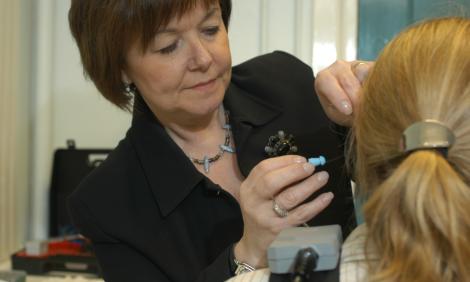Hearing aid dispenser
Hearing aid dispensers (HAD) are fully qualified clinicians who assess hearing and provide aftercare for hearing aids.
Hearing aids are designed to provide better hearing for users, including helping them to hear everyday sounds such as the doorbell and telephone and improve their ability to hear speech. They also help users listen to music and television, and make it easier for them to follow conversations in different environments and therefore more confident while talking.
All modern hearing aids are digital and hearing aid dispensers profile the amplification to meet the needs of the individual.
Working life
HADs work in a wide range of organisations from the NHS and large national high street chains to smaller self-run businesses.
In the NHS, they:
- assess the need for a hearing aid
- fit an appropriate hearing aid device/technology
- provide ongoing support and rehabilitation where appropriate
In high street outlets, they also:
- sell hearing aids
- provide a wide variety of technology, support and rehabilitation to hearing-impaired adults
HADs might have clinical responsibility for support staff including hearing aid assistants.
Who will I work with?
In the NHS, you will work as part of a team with healthcare science practitioners and clinical scientists specialising in audiology, healthcare assistants, newborn hearing screeners and doctors specialising in audiovestibular medicine.
Find out more about the training you’ll receive for a career in hearing aid dispensing
-
Most jobs in the NHS are covered by the Agenda for Change (AfC) pay scales. This pay system covers all staff except doctors, dentists and the most senior managers. Associate practitioners in the NHS will typically be on band 4, healthcare scientists start on band 5 and clinical scientists start on band 7.
Staff in the NHS will usually work a standard 37.5 hours per week. They may work a shift pattern.
Terms and conditions of service can vary for employers outside the NHS. There are several job options in the private sector ranging from working as an independent, self-employed practitioner with your own hearing aid dispensing business or working as HAD for a high street or charity employer. For employed audiologists, it is not uncommon to have a commission and benefit package that accompanies the basic salary.
-
With further training and/or experience, you may be able to develop your career further and apply for vacancies in areas such as further specialisation, management, research, or teaching.
You might develop a special interest and expertise in:
- tinnitus
- cochlear implants
- bone-anchored hearing devices
- balance assessment and rehabilitation
-
In November 2018, there were 2,962 hearing aid dispensers registered with the Health and Care Professions Council.
Most hearing aid dispensers (HADs) work in high street outlets and at other independent units such as private hospitals where they provide private hearing aids and related services directly to the public. They are either self-employed or work as part of a larger business.
The demand for hearing aids is increasing and many NHS audiologists and clinical scientists now provide private hearing services. Some NHS departments also have private audiology units with a registered HAD to sell hearing aids on NHS premises. These departments usually have a clear distinction between their private and public hearing aid service.
Finding and applying for jobs
Vacancies in organisations that deliver NHS healthcare can be found on the NHS Jobs website and apprenticeships are advertised on NHS Jobs and the Gov.uk website.
You may also find suitable vacancies in the health sector by contacting local employers directly, searching in local newspapers and by using the Find a Job tool
Find out more about applications and interviews
Volunteering is an excellent way of gaining experience (especially if you don’t have enough for a specific paid job you’re interested in) and also seeing whether you’re suited to a particular type of work. It’s also a great way to boost your confidence and you can give something back to the community!
-
For more information about the work of hearing aid dispensers, visit the British Society of Hearing Aid Audiologists website
For more information about a career as an audiologist in the NHS, visit the British Academy of Audiology website





